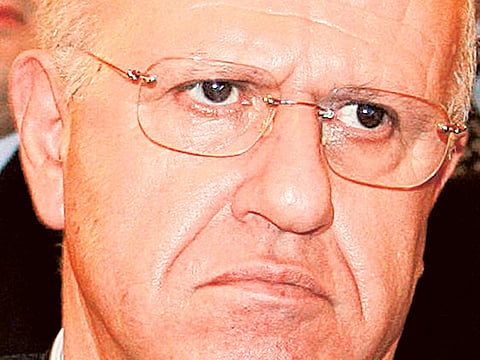Samaha retrial begins on Thursday
Retrial comes after rare public outcry over ‘light’ sentence issued over terrorism conviction

Beirut: Michel Samaha, pro-Syrian politician and former information minister, who confessed to carrying explosives and who was tried on terrorism charges, will be retried starting on July 16, after a rare public outcry that deemed the May 13 verdict by a military court—four-and-a-half years jail sentence—to be ridiculously light.
A vast majority of Lebanese derided initial calls to free Samaha given the gravity of the matter, as the former minister was bound to see his sentence sharply reduced on account of a skewed measure, which transformed the judicial year into a mere 9-months. Against a plethora of opposition, Lebanon’s highest appeals court—the Cassation Court—overturned the sentence, and ordered a retrial.
Samaha was found guilty of “having tried to carry out terrorist actions and for belonging to an armed group,” that were serious conclusions. Yet, despite the gravity of the matter, and chiefly due to political interferences that were unacceptable in a country that upheld the rule of law, the former official stood to walk free before the end of 2015 without a new prosecution.
A few months ago, the Minister of Justice Ashraf Rifi revealed that members of the Military Tribunal that presided over the initial trial apparently failed to watch video recordings of Samaha, in which the culprit recognized his misdeeds and that left no room for any doubts. It was unclear how the videos—where Samaha discussed how, why, and to what end he transported the explosives to carry out attacks and assassinations—fell into the hands of local broadcasters, though their airings rallied public opinion against the Military Tribunal. In a politically divided country that is still reeling from the three-decades old Syrian occupation (1975-2005), such blatant interferences jolted elites from their stupor to some extent, especially after Samaha acknowledged that two high-ranking Syrians knew about the assassinations he and his team intended to carry out, President Bashar Al Assad and the chief of Syrian Security Services Ali Mamlouk.
Samaha was stripped of his civil and political rights in May. He nevertheless argued that he had been the victim of entrapment, although his video confessions left no room to quibble since he explicitly told Milad Kfouri, an accomplice who was also an Internal Security Forces (ISF) informant, how the plot was hatched and who would carry it out.
The former minister was first arrested on 9 August 2012 during one of his frequent runs between the Lebanese and Syrian capitals. According to the March 14 alliance Deputy, Okab Saqr, one of Samaha’s close confidants, the former head of the Lebanese General Security Directorate, General Jamil Al Sayyed, facilitated unmolested cross-border travel. In September 2012, then Prime Minister Najib Mikati revealed that Samaha admitted his involvement to target Christian leaders in order to raise sectarian tensions. It was unclear whether the October 19, 2012 assassination of Wissam Al Hassan, the head of the intelligence branch of the ISF was related to the Samaha case, even though Al Hassan, one of the country’s most skilled counter-terrorism experts, played a central role in the criminal’s arrest.
Inasmuch as the Military Tribunal, presumably with a fresh batch of judges, was still the venue where Samaha’s second trial would occur, it was unclear how Lebanese citizens would react should a similar verdict be rendered. What was clear, nonetheless, was that damaging videos could no longer be suppressed as evidence.



